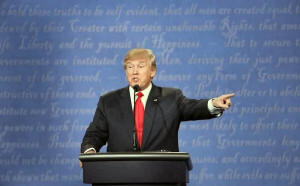|
Rigged elections? Nasty woman? Trump's
scorched earth tactics have little upside
 Send a link to a friend
Send a link to a friend
 [October 20, 2016]
By James Oliphant and Chris Kahn [October 20, 2016]
By James Oliphant and Chris Kahn
(Reuters) - Republican Donald Trump had one
last chance at a nationally televised debate to reach out to the
undecided voters he badly needs to keep his presidential campaign
viable.
He passed on the opportunity. Instead, he chose on Wednesday to stay
with the strategy he has employed during recent weeks: Pump up his
hard-core supporters and hope that's enough to win.
He suggested he might not accept the election result if his Democratic
opponent Hillary Clinton wins on Nov. 8, called her a “nasty woman,” and
repeated hard-line conservative positions on issues such as abortion and
immigration.
While that kind of rhetoric was catnip to his passionate,
anti-establishment base, it is unlikely to have appealed to independent
voters and women who have yet to choose a candidate.
“When you’re trailing in the polls, you don’t need a headline the next
morning saying that you’re not going to accept the election results,”
said Ford O’Connell, a Republican strategist who supports Trump.

With less than three weeks left in the race, Trump is behind Clinton in
most battleground states and is underperforming in almost every
demographic voter group compared to the Republican nominee, Mitt Romney,
four years ago. Party strategists had said before the debate that he
needed to use the event to draw in voters beyond his hard-core
supporters.
Trump didn't listen or perhaps didn't care.
STRATEGY MAY BACKFIRE
His debate was a continuation of his apparent strategy to ensure his
most fervent supporters show up on Election Day, while betting that his
attacks on Clinton's character and truthfulness will discourage voting
by already skeptical young and liberal Democrats.
But experts who study voter behavior warned that his attacks on Clinton
may backfire, saying he may instead awaken Democratic voters who have so
far been uninspired by Clinton.
“The risk he faces by engaging in a scorched-earth policy is that he
activates people rather than turning them off,” said Michael McDonald,
who runs the U.S. Election Project at the University of Florida.
McDonald, who tracks early voting returns and absentee ballot requests,
said he is seeing larger than expected surges of support for Clinton in
southeastern states such as Virginia, North Carolina, and Florida.
The Reuters/Ipsos States of the Nation project, which uses a massive
online opinion poll to project election outcomes in all 50 states,
estimates that Clinton has a 95 percent chance of winning the election
by about 118 votes in the Electoral College if it were held today.
It is against this backdrop that Trump has apparently decided to double
down on energizing his base rather than broadening it. But the poll
results cast doubt on the wisdom of that strategy.
[to top of second column] |

Republican U.S. presidential nominee Donald Trump speaks during the
third and final debate with Democratic nominee Hillary Clinton (not
pictured) at UNLV in Las Vegas, Nevada, U.S., October 19, 2016.
REUTERS/Rick Wilking

If Trump’s core white, male, working class supporters vote at high
rates, as expected, that likely won’t be enough to win. Trump, for
example, already does well with white men who are at retirement age.
Nine out of 10 of them are already expected to vote, according to
the polling results, so, there is little room to squeeze out more
votes.
RIGGED ELECTION
Voting rights activists have accused Trump of trying to suppress
voter turnout by claiming, without evidence, that the election has
been rigged against him. He has also said his supporters need to
monitor polling stations to ensure a fair vote, which the activists
decry as an act of intimidation.
Should Trump's comments succeed in discouraging some Democratic
voters from turning out, that may also not be enough to help him
secure the White House. He still loses under what could be
considered a dream scenario for the Republican nominee: white men
show up in greater numbers than expected, while turnout among racial
minorities is lower than expected.
In this scenario, the States of the Nation project estimates that
Trump would win the battleground states of Ohio and North Carolina,
and he would have a shot at winning Pennsylvania, Wisconsin and
Colorado. Even then, Clinton would still have an 82 percent chance
of winning the election.
There’s yet another risk to Trump’s strategy. By claiming the
election is rigged, he could be unintentionally signaling to his
supporters that voting no longer matters.
Michael Sopko, 63, a mortgage broker from Denver and a Trump backer,
said before the debate that he sees his vote as pointless.

"They have already been corrupted," he said of voting machines,
speaking ahead of a Trump rally in Colorado Springs. "I think the
results are already cast."
(Reporting by James Oliphant, Chris Kahn, and Emily Stephenson,
editing by Paul Thomasch and Ross Colvin)
[© 2016 Thomson Reuters. All rights
reserved.]
Copyright 2016 Reuters. All rights reserved. This material may not be published,
broadcast, rewritten or redistributed. |